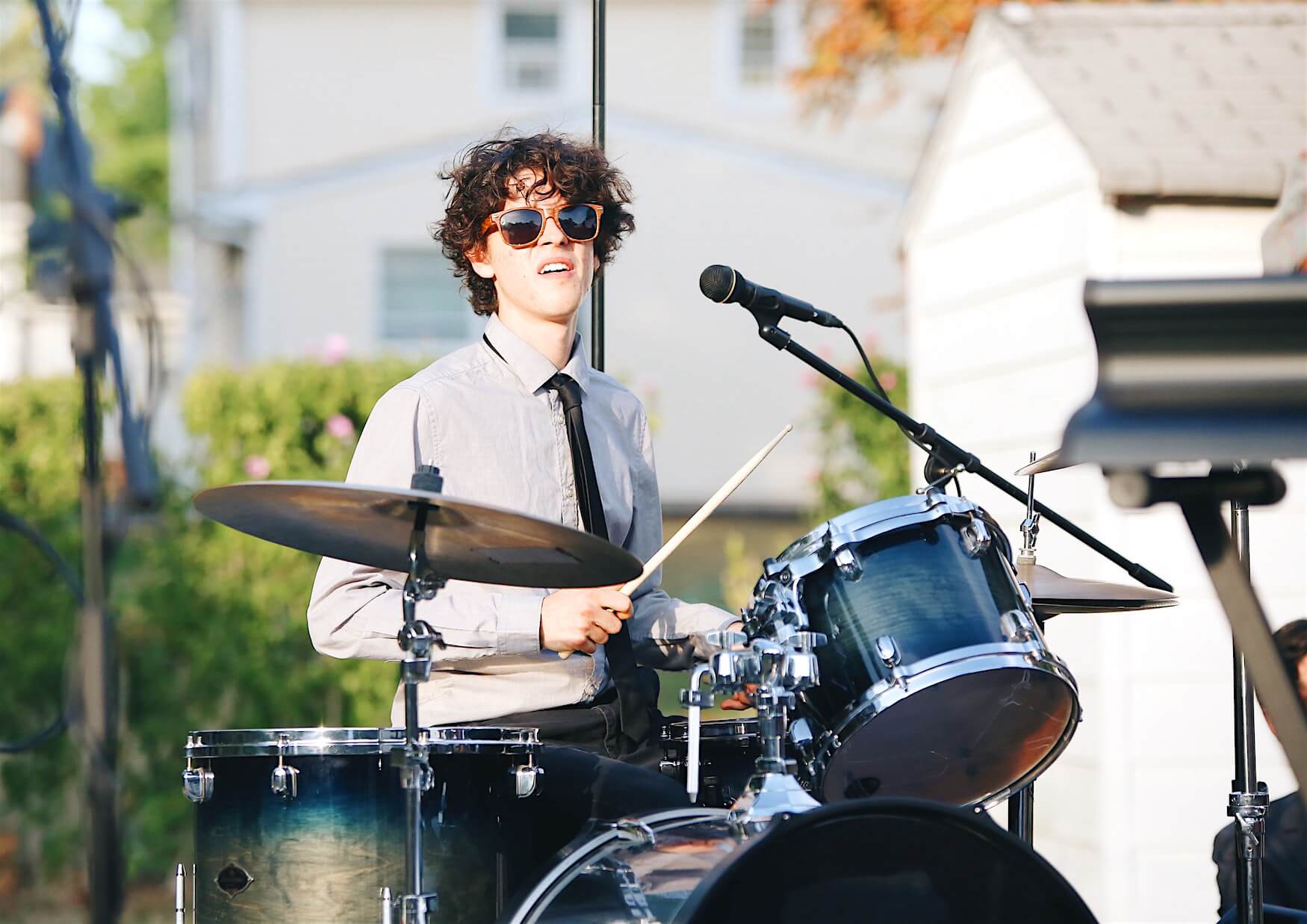Shine and poverty: how to make a living if you are a musician
In a previous article, we talked about how the digital revolution affected the earnings of musicians. Today, for many groups, selling albums and singles is unable to even recoup the cost of recording music, not to mention profit. In this situation, musicians have to look for alternative sources of income. We will begin to talk about them in this material. Photo Andy Lee / Unsplash

The only way to guarantee a stable income while making music is to work in another field at the same time. This is not a new phenomenon , but recently, making music the main source of income for many has become simply impossible. It is not surprising that the vast majority of groups that do not reach the status of "superstars" live on a salary.
Take, for example, the Japanese rock band toe . She has loyal fans, she regularly tours around the world, but three of her four members are simultaneously engaged in another job. One of the guitarists is an interior designer , the other is a sound engineer, and the bassist is a shoe designer. Office work does not fit well with concert schedules, which is why the “main” professions of such musicians are mostly creative.
Alternative genres, for example black metal - one of the main directions of the Norwegian "music for export" - is no exception to the rule. Many legendary performers who created this phenomenon lead a completely normal lifestyle. Harvard Ellefsen (Håvard Ellefsen), the former bassist of the Emperor , is engaged in several works at the same time to feed the family.
According to him , for most of the artists, the music industry is just a way to spend money. Nocturno Culto, Darkthrone's vocalist, works as a school teacher , and his band mate has gone into politics. They rarely tour, so they can afford the "sedentary" profession.
Combining music with regular work is not easy. You need to allocate time for rehearsals, sound recordings, tours, and at the same time not to go bankrupt and not go crazy. Therefore, some performers tour as often as they can - in the hope that concert fees will help them devote themselves to music and become a plus.
But life "on wheels" is not as glamorous as it might seem. Many people like to imagine the tour as an endless vacation with the defeat of hotel rooms, a martini for breakfast and crowds of “ groups ”. Reality is harder and even worse for health than this teenage fantasy.

Photo by Michael Benz / Unsplash
Since earnings from music sales have declined markedly, there are more people who want to play live. This allowed concert venues to increase pricing control. Festivals pay performers as much as they want . Many groups, even quite popular ones, are forced to tour “minus”. For them, concerts are advertising projects.
Pomplamoose , a group known for non-standard covers of radio hits and original material on the verge of genres, organized a tour of America in 2014. At that time, their music already sounded in television commercials, and on social networks they had millions of views and hundreds of thousands of subscribers. But this tour did not become profitable. At the end of the tour, their keyboard player published a post in which he describedfinancial side of the situation .
The general public condemns them for their blatant improvisations and the addiction of fans to userelaxing substances during concerts. Their payback is rather an exception to the rule.
Some artists survive by adding variety to their music portfolio. They play in several groups at once. For jazz musicians, this is the norm.
The outstanding British pianist Kit Downes (Kit Downes) in addition to his own projects plays in nine different bands. True, this is also not a guarantee of stable earnings. Nels Cline (Nels Cline), now known as the guitarist of the band Wilco, for many years built a jazz career.
Klein’s name graced dozens of releases, both as a frontman and as a comma, as a secondary contributor to the project. However, he had to work as a salesman in a record store to feed himself.

Photo David Sarkisov / Unsplash
Good drummers are always in demand. Therefore, it is easier for them than other musicians to become part of a large number of groups. Takashi Kashikura from toe is involved in a number of side projects of varying degrees of success, which allows him to finance personal creativity. He is a drummer at The Hiatus, a commercial stadium gathering supergroup. In addition, Takashi works in a studio with many teams - from avant-garde fusion performers to production projects.
A similar life is led by Zohar Barzilai , brother of last year's Netta Eurovision winner . He is one of the most popular drummers in Israel, and is touring with a large number of bands.
At one end of the spectrum of his colleagues is Liron Amram, the rising star of the independent Israeli scene. On the other - Arkady Dukhin, author of popular radio hits. Among Russian musicians, one can cite the example of a flutist, keyboard player and singer Yan Nikolenko . He is known for working with four groups, alternating between “commercial” and “personal” projects. His activities in the BI-2 and Spleen groups supported the recording of material for the Oedipus Complex and Networks.
Unfortunately, all the success stories described in this section have one thing in common. These musicians found large commercial projects that took them under the wing and allowed them to finance independent work. Playing in twenty groups for free is as useless as playing in one unpopular collective. But if people from popular groups pay attention to independent work and invite to play for themselves - this, of course, is an option.
PS This is not the end of the story. In the following articles we will talk about how and who “exploits” their brand, is engaged in crowdfunding and commercial music.
Additional reading from our “Hi-Fi World” and Telegram channel:
 “I want music, but I don’t want all this”: how to start working in the music industry
“I want music, but I don’t want all this”: how to start working in the music industry
 Nick Cave: “Perhaps rock music does not deserve salvation”
Nick Cave: “Perhaps rock music does not deserve salvation”
 What is 8D- audio - discussing a new trend
What is 8D- audio - discussing a new trend
 Technological musical instruments until the 20th century
Technological musical instruments until the 20th century
 Music in films and TV shows that we hear too often
Music in films and TV shows that we hear too often
 Once popular audio gadgets that are already “outdated”
Once popular audio gadgets that are already “outdated”
 Vinyl instead of a postage stamp: an unusual rarity
Vinyl instead of a postage stamp: an unusual rarity

"Normal" work
The only way to guarantee a stable income while making music is to work in another field at the same time. This is not a new phenomenon , but recently, making music the main source of income for many has become simply impossible. It is not surprising that the vast majority of groups that do not reach the status of "superstars" live on a salary.
Take, for example, the Japanese rock band toe . She has loyal fans, she regularly tours around the world, but three of her four members are simultaneously engaged in another job. One of the guitarists is an interior designer , the other is a sound engineer, and the bassist is a shoe designer. Office work does not fit well with concert schedules, which is why the “main” professions of such musicians are mostly creative.
Alternative genres, for example black metal - one of the main directions of the Norwegian "music for export" - is no exception to the rule. Many legendary performers who created this phenomenon lead a completely normal lifestyle. Harvard Ellefsen (Håvard Ellefsen), the former bassist of the Emperor , is engaged in several works at the same time to feed the family.
According to him , for most of the artists, the music industry is just a way to spend money. Nocturno Culto, Darkthrone's vocalist, works as a school teacher , and his band mate has gone into politics. They rarely tour, so they can afford the "sedentary" profession.
It is not necessary to play music of niche genres in order to experience financial difficulties. Brooklyn rapper Ka , whose last album was featured on the list of " best hip-hop releases of the year " and was warmly received by critics, still works as a firefighter . His musical career began more than 20 years ago.
Concert Tours: Forced Evil
Combining music with regular work is not easy. You need to allocate time for rehearsals, sound recordings, tours, and at the same time not to go bankrupt and not go crazy. Therefore, some performers tour as often as they can - in the hope that concert fees will help them devote themselves to music and become a plus.
But life "on wheels" is not as glamorous as it might seem. Many people like to imagine the tour as an endless vacation with the defeat of hotel rooms, a martini for breakfast and crowds of “ groups ”. Reality is harder and even worse for health than this teenage fantasy.

Photo by Michael Benz / Unsplash
Since earnings from music sales have declined markedly, there are more people who want to play live. This allowed concert venues to increase pricing control. Festivals pay performers as much as they want . Many groups, even quite popular ones, are forced to tour “minus”. For them, concerts are advertising projects.
Pomplamoose , a group known for non-standard covers of radio hits and original material on the verge of genres, organized a tour of America in 2014. At that time, their music already sounded in television commercials, and on social networks they had millions of views and hundreds of thousands of subscribers. But this tour did not become profitable. At the end of the tour, their keyboard player published a post in which he describedfinancial side of the situation .
They earned about one hundred thousand dollars from ticket sales. At the same time, the total costs of transportation, accommodation, food, insurance, technical support, printing of posters and other expenses exceeded this amount by 47 thousand dollars.Of course, there are groups whose whole image is based on concert performances. Previously, they were the Grateful Dead , now they are their "spiritual heirs" Phish . They almost never focus on studio recordings, and each of their concerts is a unique experience that many compare to religious . Thanks to this, Phish fans often go on tour with the group and attend several tour performances at once. Musicians monetize the process and conduct a paid live broadcast of their concerts. But despite success, Phish remains a very niche group.
If most of this money did not come from the personal savings of the musicians (it’s good that they had savings), it would be impossible to go on such a tour (taking into account the sale of the “merch” and financial support from sponsors, the loss of the group amounted to almost $ 12 thousand). Suddenly, the touring life does not seem so attractive.
The general public condemns them for their blatant improvisations and the addiction of fans to userelaxing substances during concerts. Their payback is rather an exception to the rule.
Side projects
Some artists survive by adding variety to their music portfolio. They play in several groups at once. For jazz musicians, this is the norm.
The outstanding British pianist Kit Downes (Kit Downes) in addition to his own projects plays in nine different bands. True, this is also not a guarantee of stable earnings. Nels Cline (Nels Cline), now known as the guitarist of the band Wilco, for many years built a jazz career.
Klein’s name graced dozens of releases, both as a frontman and as a comma, as a secondary contributor to the project. However, he had to work as a salesman in a record store to feed himself.

Photo David Sarkisov / Unsplash
Good drummers are always in demand. Therefore, it is easier for them than other musicians to become part of a large number of groups. Takashi Kashikura from toe is involved in a number of side projects of varying degrees of success, which allows him to finance personal creativity. He is a drummer at The Hiatus, a commercial stadium gathering supergroup. In addition, Takashi works in a studio with many teams - from avant-garde fusion performers to production projects.
A similar life is led by Zohar Barzilai , brother of last year's Netta Eurovision winner . He is one of the most popular drummers in Israel, and is touring with a large number of bands.
At one end of the spectrum of his colleagues is Liron Amram, the rising star of the independent Israeli scene. On the other - Arkady Dukhin, author of popular radio hits. Among Russian musicians, one can cite the example of a flutist, keyboard player and singer Yan Nikolenko . He is known for working with four groups, alternating between “commercial” and “personal” projects. His activities in the BI-2 and Spleen groups supported the recording of material for the Oedipus Complex and Networks.
Unfortunately, all the success stories described in this section have one thing in common. These musicians found large commercial projects that took them under the wing and allowed them to finance independent work. Playing in twenty groups for free is as useless as playing in one unpopular collective. But if people from popular groups pay attention to independent work and invite to play for themselves - this, of course, is an option.
PS This is not the end of the story. In the following articles we will talk about how and who “exploits” their brand, is engaged in crowdfunding and commercial music.
Additional reading from our “Hi-Fi World” and Telegram channel:
 “I want music, but I don’t want all this”: how to start working in the music industry
“I want music, but I don’t want all this”: how to start working in the music industry  Nick Cave: “Perhaps rock music does not deserve salvation”
Nick Cave: “Perhaps rock music does not deserve salvation”  What is 8D- audio - discussing a new trend
What is 8D- audio - discussing a new trend  Technological musical instruments until the 20th century
Technological musical instruments until the 20th century  Music in films and TV shows that we hear too often
Music in films and TV shows that we hear too often  Once popular audio gadgets that are already “outdated”
Once popular audio gadgets that are already “outdated”  Vinyl instead of a postage stamp: an unusual rarity
Vinyl instead of a postage stamp: an unusual rarity